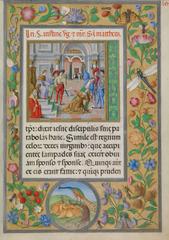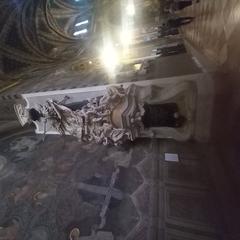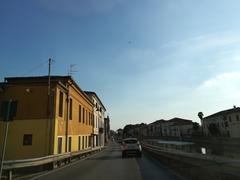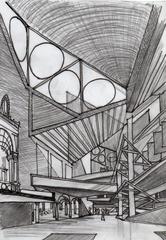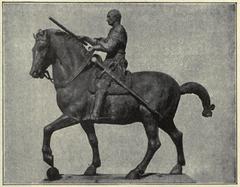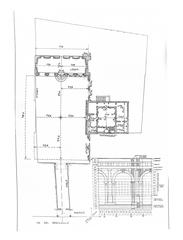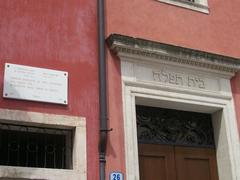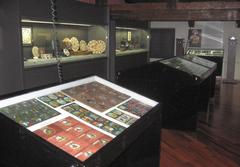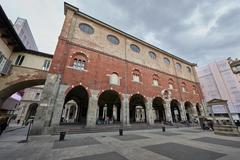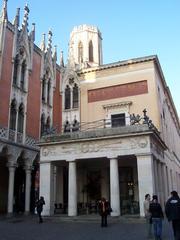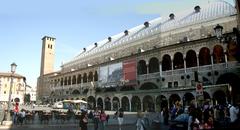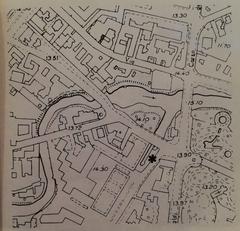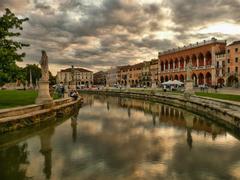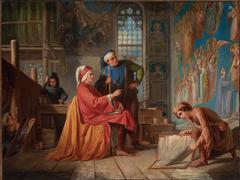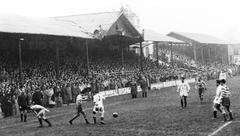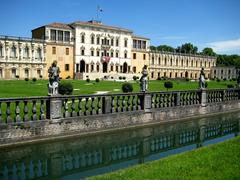
Bo Palace Visiting Hours, Tickets, and Complete Visitor Guide to Padua’s Historic Landmark
Date: 04/07/2025
Introduction
Bo Palace (Palazzo del Bo), located in the vibrant historic center of Padua, Italy, is the iconic seat of the University of Padua—one of Europe’s oldest and most prestigious universities. This Renaissance palace is not only a symbol of academic excellence and architectural mastery, but also a living monument where centuries of tradition, innovation, and cultural exchange converge. From its medieval origins as the Hospitium Bovis to its modern role as a hub for research, education, and public engagement, Bo Palace offers a fascinating journey through the history of learning, science, and the arts.
This comprehensive guide covers everything you need to know about visiting Bo Palace: its history, highlights, guided tour information, accessibility, nearby attractions, and essential tips for making the most of your visit.
Table of Contents
- Introduction
- Historical Overview
- Architectural & Artistic Highlights
- Visiting Bo Palace
- Nearby Attractions in Padua
- Frequently Asked Questions (FAQ)
- Summary and Key Information
- Contact Details & Further Resources
Historical Overview
Medieval Foundations
The origins of Bo Palace date to the 13th century, when the site served as the Hospitium Bovis (“Ox Inn”), a medieval tavern that lent its name and ox insignia (“bo” in Venetian dialect) to the palace (renatoprosciutto.com). In 1222, scholars fleeing the University of Bologna’s restrictive climate founded the University of Padua here, establishing a tradition of academic freedom and multicultural exchange (turismopadova.it). The university quickly became a magnet for Italian and foreign students alike, as reflected in the historic division between the “Ultramontani” (foreigners) and “Citramontani” (Italians).
Renaissance Expansion
In the late 15th and 16th centuries, the university centralized its activities at Palazzo Bo. Under architect Andrea Moroni, the palace was transformed into a Renaissance masterpiece, with the construction of the Cortile Antico (Ancient Courtyard) and elegant loggias. The acquisition of surrounding buildings led to a complex layering of medieval and Renaissance architectural features (medicine.museum).
Scientific Advancements
Bo Palace became a center for scientific progress in the late Renaissance. In 1594, Girolamo Fabrici d’Acquapendente designed the world’s first permanent anatomical theatre—a revolutionary teaching space for medical students (heritage.unipd.it). Luminaries such as Galileo Galilei lectured here, and Elena Cornaro Piscopia, the first woman to earn a university degree, is immortalized within its walls (cppadova.com).
Modern Renovations
The palace underwent significant 19th- and 20th-century renovations. The Aula Magna (Great Hall) was redecorated with frescoes, and architect Gio Ponti’s 1930s–40s interventions introduced Rationalist elements and modern artworks, blending tradition with innovation (turismopadova.it).
Architectural & Artistic Highlights
Cortile Antico and Coats of Arms
At the heart of Bo Palace lies the Cortile Antico, an exquisite Renaissance courtyard framed by double loggias and adorned with hundreds of coats of arms. These heraldic symbols represent student “nations” and rectors from across centuries, emphasizing Padua’s cosmopolitan academic legacy (medicine.museum).
The Anatomical Theatre
The Anatomical Theatre, constructed in 1594, is the oldest of its kind in the world. Its steep, elliptical galleries allowed up to 300 students to observe dissections, marking a turning point in European medical education (heritage.unipd.it; renatoprosciutto.com).
Aula Magna and Major Halls
- Aula Magna (Galileo Galilei Great Hall): Site of major academic ceremonies, decorated with 20th-century frescoes and portraits of university luminaries, including Galileo and Elena Cornaro Piscopia (turismopadova.it).
- Sala dei Quaranta (Hall of Forty): Features portraits of forty distinguished international scholars and houses Galileo’s original lectern (cppadova.com).
- Sala di Medicina & Sala di Giurisprudenza: Dedicated to the medical and law faculties, filled with historic furnishings and insignia.
20th-Century Additions by Gio Ponti
Gio Ponti’s renovations introduced Rationalist design, modern materials, and artworks by Funi, Severini, and others. His architectural interventions, especially in the Rectorate and New Courtyard, reflect a dialogue between modernity and tradition (turismopadova.it).
Artistic Heritage
Bo Palace is home to frescoes, paintings, and sculptures across centuries. Highlights include Achille Funi’s monumental frescoes in the Aula Magna and the statue of Elena Cornaro Piscopia, underscoring the university’s progressive spirit (cppadova.com).
Other notable features:
- Stolpersteine: Memorial stones at the palace entrance for Jewish students deported during WWII (lonelyplanet.com).
- Standard Measurements: Marble benchmarks on the façade, historically used for commerce (dolcevia.com).
Visiting Bo Palace
Guided Tours & Types
Access to Bo Palace is exclusively by guided tour, ensuring both preservation and an in-depth visitor experience. Two main tour types are available:
- Historical Tour (Monday–Friday): Focuses on Renaissance and early modern spaces, including the Anatomical Theatre, courtyards, Aula Magna, and historic halls.
- 20th-Century Additions Tour (Saturday, Sunday, Holidays): Explores Gio Ponti’s modern renovations and contemporary artworks (turismopadova.it).
Tours last about 45–60 minutes and are offered in Italian and English. Advance booking is essential.
Visiting Hours
- Monday to Friday: Historical tours, generally 9:00 AM–6:00 PM
- Saturday, Sunday, Holidays: 20th-century tours, typically 10:00 AM–4:00 PM
- Closed: December 24, 25, 31, and January 1. Tours may be suspended during major university events.
- Always check the latest schedule and availability on the official university website prior to your visit.
Ticket Information & Booking
- Standard Adult Ticket: Approx. €10–€12
- Reduced (students, seniors): Approx. €8
- Children under 12: Free (varies; check official site)
- Special Thematic Tours: Prices may vary (e.g., “Solstitium Bovis” solstice tours)
- Booking: Reserve and prepay tickets via the University of Padua’s official website or, for special events, by phone or email.
- No refunds or modifications after booking.
Accessibility & Visitor Services
- Physical Access: Historic architecture poses some limitations, but elevators and accessible routes are available for major spaces. Contact the university’s visitor center for personalized arrangements (turismopadova.it).
- VisitUniPD App: Provides virtual tours, maps, and multimedia content for enhanced accessibility (unipd.it).
- Visitor Support: The Public Engagement Office assists daily from 9:00 to 17:00.
Practical Tips
- Book in Advance: Tours are popular and capacity is limited.
- Check for Closures: Some rooms may be inaccessible due to university events.
- Specify Tour Language: Choose Italian or English when booking.
- Photography: Allowed in most areas except during academic events or in restricted rooms. No flash/tripods.
- No Cloakroom/Luggage Storage: Plan accordingly.
- Facilities: Restrooms available; nearby cafés for refreshments.
- Duration: Allow 1–1.5 hours for your visit.
Nearby Attractions in Padua
Enhance your visit to Bo Palace by exploring Padua’s other renowned sites:
- Scrovegni Chapel: Giotto’s fresco masterpiece (thetravelfolk.com)
- Prato della Valle: One of Europe’s largest squares
- Basilica of Saint Anthony: Major pilgrimage site
- Orto Botanico di Padova: World’s oldest university botanical garden
Bo Palace’s central location allows easy access to these landmarks on foot or via public transit.
Frequently Asked Questions (FAQ)
Can I visit Bo Palace without a guide?
No, access is only via guided tour to preserve the building and its academic function.
How do I buy tickets?
Book in advance through the University of Padua’s official website.
Is Bo Palace wheelchair accessible?
Main areas are accessible, but some historic sections may have limitations. Contact the visitor center for assistance.
Are children welcome?
Yes, children are welcome on tours but must be supervised.
Is photography allowed?
Generally yes, except during academic events or in certain rooms. Always follow your guide’s instructions.
What’s the best time to visit?
Weekday mornings are less crowded. Reserve in advance, especially for special events.
Summary of Bo Palace Visiting Tips and Key Information
Bo Palace stands as a testament to Padua’s enduring legacy of knowledge, innovation, and inclusivity. Visitors can explore Renaissance courtyards, the world’s first anatomical theatre, and halls graced by thinkers like Galileo. Guided tours offer unique insights while safeguarding the palace’s active university functions. Booking ahead and checking for updates ensures a smooth, memorable visit. With its prime location, Bo Palace is the perfect starting point for discovering Padua’s rich cultural heritage (renatoprosciutto.com; turismopadova.it; heritage.unipd.it; cppadova.com; unipd.it; thetravelfolk.com).
Contact Details & Further Resources
- Address: Via VIII Febbraio 2, 35122 Padua, Italy
- Phone: +39 049 827 3939
- Official website and bookings: https://www.unipd.it/en/guidedtours
Recommended visuals:
- Images of the Bo Palace façade, Anatomical Theatre, Aula Magna (with descriptive alt tags)
- Interactive map of Padua’s historic center
- Virtual tour links via the VisitUniPD app
References and Further Reading
- Palazzo Bo Padua: Visiting Hours, Tickets, and Historical Guide, 2024, renatoprosciutto.com
- Bo Palace Padua: Visiting Hours, Tickets, and Historical Significance, 2024, medicine.museum
- Bo Palace Visiting Hours, Tickets & History | Discover Padua’s Historic University Site, 2024, University of Padua
- Bo Palace Padua: Visiting Hours, Tickets, and Historical Guide, 2024, Turismo Padova
- Bo Palace Padua: Visiting Hours, Tickets, and Historical Guide, 2024, CPPadova
- Bo Palace Padua: Visiting Hours, Tickets, and Historical Guide, 2024, Heritage University of Padua
- Bo Palace Padua: Visiting Hours, Tickets, and Historical Guide, 2024, The Travel Folk
Plan your visit to Bo Palace today—book your guided tour, download the Audiala app for audio guides, and follow the University of Padua’s official channels for updates and special events. Discover where centuries of knowledge and innovation come alive in the heart of Padua.



